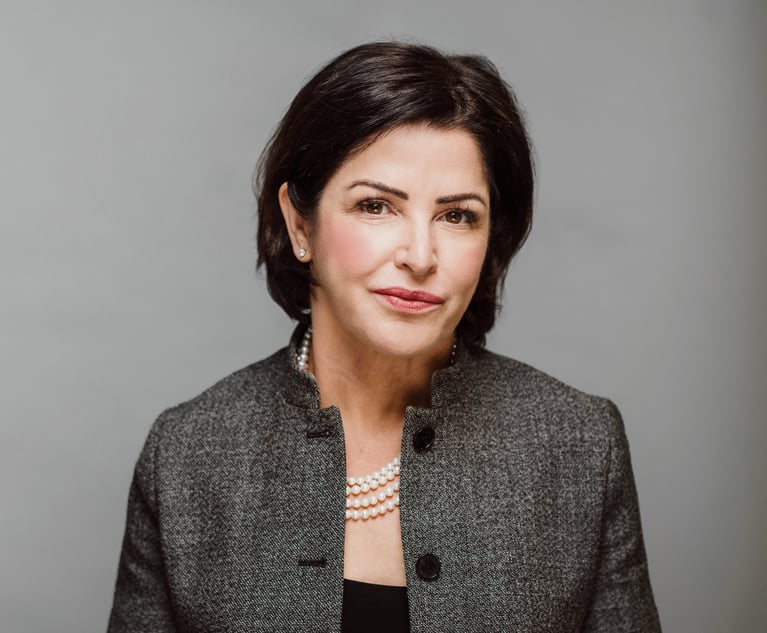Panel processes and law firms: there is no such thing as a free secondee
Are smaller law firms being treated unfairly by corporates looking for added extras from their advisers?
December 05, 2018 at 05:36 AM
4 minute read
I have recently had cause to reflect about why so many law firm panels are made up of larger full-service firms, whereas specialist and boutique law firms are generally underrepresented.
It may seem like special pleading from the managing partner of a boutique competition law firm – but please don't turn the page quite yet.
There is real benefit to companies that take a different approach. Where we have been appointed to a panel, it has been on the back of the fact that we are innovative, disruptive and able to offer premium quality at fixed or capped fees. Because we are not highly geared, and we control our costs, we have less emphasis on hourly rates. If we need to take on a large job, we will work with the client on how to staff it, often using in-house expertise and resource in a way that is 'built-in and not bolt-on'.
Our strength is precisely in the fact that we have the flexibility to take on those jobs that other firms might struggle to staff efficiently, while operating to the highest quality standards.
Over the years, many panel processes have become both more sophisticated and more complicated, and in addition to the normal requirements of diversity, IT security, health and safety etc, they often include detailed requests for 'free' knowhow, 'free' secondments, 'free' training, 'free' value-added services. Often, these developments are driven by internal forces inside the company that need to show the direct value derived from the procurement process.
However, the unintended consequence is twofold – first, it deters smaller boutique firms from competing for the business as they do not have the scale and margins to offer such add-ons; and second, it obscures the real price competition that exists between the different models. Ultimately there is no such thing as a 'free' secondee – lawyers cost money and firms will have to build those costs into their margins.
I am very encouraged by the fact that some large multinationals are looking again at their panel criteria in order to add boutique firms to the list – often by creating special appointment procedures for niche firms.
But there are many large domestic and pan-European players that are still stuck in a world where panel processes are still seen as a way of squeezing a bit more value out of the same small number of relationship firms, whose interest is not to challenge the status quo. That derived value is hard to observe and even harder to quantify.
Far from asking for special treatment, boutique law firms are delighted to compete on quality and price, if they are invited into the process. They are much more than a stalking horse for the larger firms and, in many circumstances, they can be useful complements as well as competitors. Companies that allow us into their panel process will see tangible benefits in the shape of great quality and a more flexible approach to pricing.
We all like getting something for free. Free alloys on your new car, a free luggage allowance when you book your ticket, or even a free secondee from your relationship firm. The difference is that you would never refuse to consider a car that does not come with free alloys, or indeed exclude an airline on the basis of its luggage charges. But that is precisely what many companies do when it comes to selecting panel firms.
So, if you are a general counsel or procurement manager reading this, I have a simple message: boutique law firms add skill, diversity, innovation and transparency to your panel, and they can bring real and tangible benefits to the way you do business. You just have to open the door.
Oliver Bretz is the founding partner of Euclid Law.
This content has been archived. It is available through our partners, LexisNexis® and Bloomberg Law.
To view this content, please continue to their sites.
Not a Lexis Subscriber?
Subscribe Now
Not a Bloomberg Law Subscriber?
Subscribe Now
NOT FOR REPRINT
© 2025 ALM Global, LLC, All Rights Reserved. Request academic re-use from www.copyright.com. All other uses, submit a request to [email protected]. For more information visit Asset & Logo Licensing.
You Might Like
View All

Pallas Partners Founder On the Disputes Trends to Look Out For in 2025
4 minute read
What to Expect From Teresa Ribera, the EU‘s New Competition Commissioner
6 minute readTrending Stories
- 1Public Notices/Calendars
- 2Wednesday Newspaper
- 3Decision of the Day: Qui Tam Relators Do Not Plausibly Claim Firm Avoided Tax Obligations Through Visa Applications, Circuit Finds
- 4Judicial Ethics Opinion 24-116
- 5Big Law Firms Sheppard Mullin, Morgan Lewis and Baker Botts Add Partners in Houston
Who Got The Work
J. Brugh Lower of Gibbons has entered an appearance for industrial equipment supplier Devco Corporation in a pending trademark infringement lawsuit. The suit, accusing the defendant of selling knock-off Graco products, was filed Dec. 18 in New Jersey District Court by Rivkin Radler on behalf of Graco Inc. and Graco Minnesota. The case, assigned to U.S. District Judge Zahid N. Quraishi, is 3:24-cv-11294, Graco Inc. et al v. Devco Corporation.
Who Got The Work
Rebecca Maller-Stein and Kent A. Yalowitz of Arnold & Porter Kaye Scholer have entered their appearances for Hanaco Venture Capital and its executives, Lior Prosor and David Frankel, in a pending securities lawsuit. The action, filed on Dec. 24 in New York Southern District Court by Zell, Aron & Co. on behalf of Goldeneye Advisors, accuses the defendants of negligently and fraudulently managing the plaintiff's $1 million investment. The case, assigned to U.S. District Judge Vernon S. Broderick, is 1:24-cv-09918, Goldeneye Advisors, LLC v. Hanaco Venture Capital, Ltd. et al.
Who Got The Work
Attorneys from A&O Shearman has stepped in as defense counsel for Toronto-Dominion Bank and other defendants in a pending securities class action. The suit, filed Dec. 11 in New York Southern District Court by Bleichmar Fonti & Auld, accuses the defendants of concealing the bank's 'pervasive' deficiencies in regards to its compliance with the Bank Secrecy Act and the quality of its anti-money laundering controls. The case, assigned to U.S. District Judge Arun Subramanian, is 1:24-cv-09445, Gonzalez v. The Toronto-Dominion Bank et al.
Who Got The Work
Crown Castle International, a Pennsylvania company providing shared communications infrastructure, has turned to Luke D. Wolf of Gordon Rees Scully Mansukhani to fend off a pending breach-of-contract lawsuit. The court action, filed Nov. 25 in Michigan Eastern District Court by Hooper Hathaway PC on behalf of The Town Residences LLC, accuses Crown Castle of failing to transfer approximately $30,000 in utility payments from T-Mobile in breach of a roof-top lease and assignment agreement. The case, assigned to U.S. District Judge Susan K. Declercq, is 2:24-cv-13131, The Town Residences LLC v. T-Mobile US, Inc. et al.
Who Got The Work
Wilfred P. Coronato and Daniel M. Schwartz of McCarter & English have stepped in as defense counsel to Electrolux Home Products Inc. in a pending product liability lawsuit. The court action, filed Nov. 26 in New York Eastern District Court by Poulos Lopiccolo PC and Nagel Rice LLP on behalf of David Stern, alleges that the defendant's refrigerators’ drawers and shelving repeatedly break and fall apart within months after purchase. The case, assigned to U.S. District Judge Joan M. Azrack, is 2:24-cv-08204, Stern v. Electrolux Home Products, Inc.
Featured Firms
Law Offices of Gary Martin Hays & Associates, P.C.
(470) 294-1674
Law Offices of Mark E. Salomone
(857) 444-6468
Smith & Hassler
(713) 739-1250










